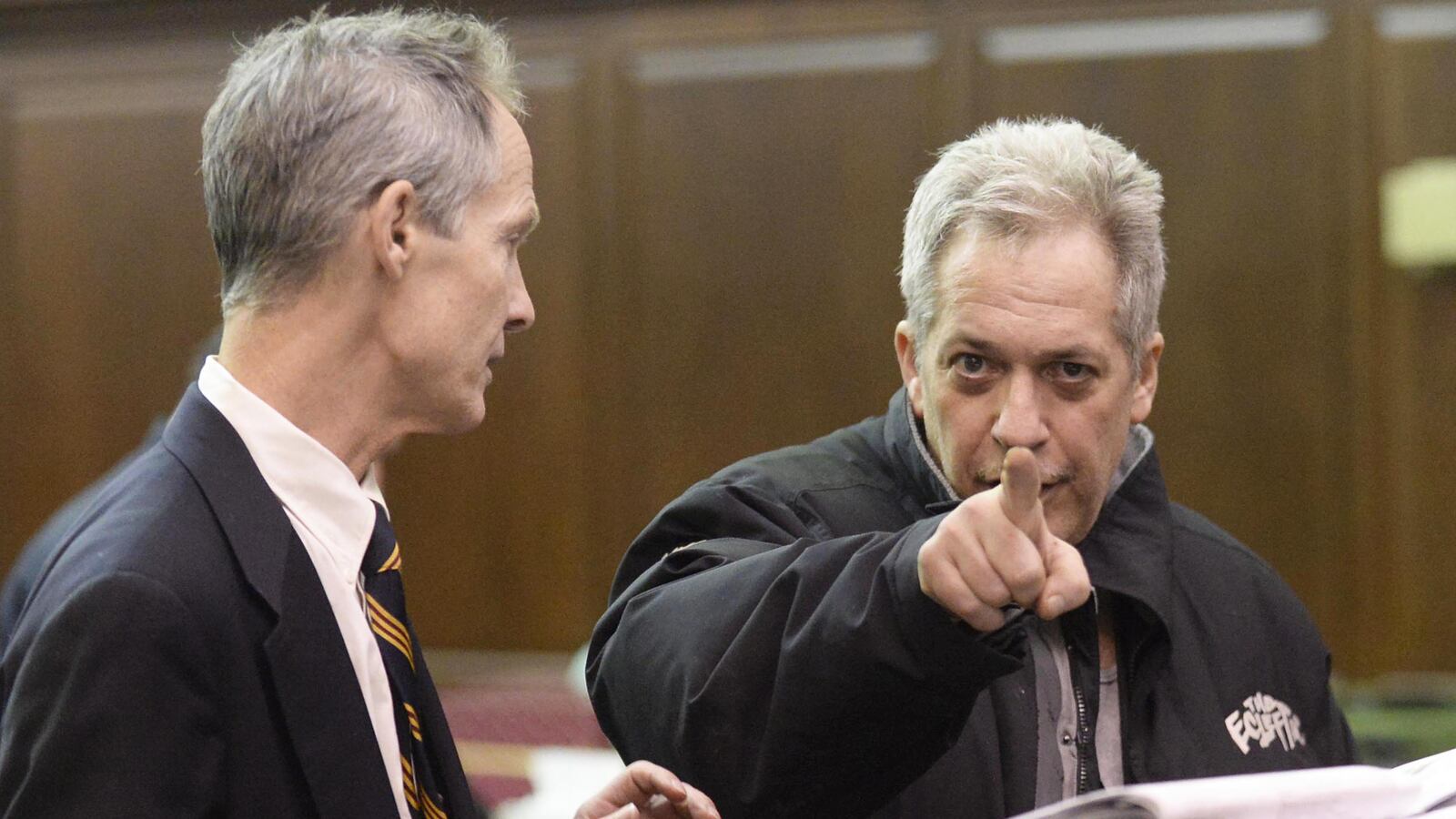On the drive from her home to her father's wake on Thursday, Philip Seymour Hoffman's younger daughter fell asleep.

And of all the scenes ever witnessed at the entrance to the Frank E. Campbell funeral chapel over the decades—it has handled everybody from Irving Berlin to Biggie Smalls to Joan Crawford to John Lennon to Jacqueline Kennedy Onassis to Damon Runyon to Walter Cronkite to Tennessee Williams to Heath Ledger to Jack Maple and such 9/11 FDNY heroes as Terry Hatton and Michael Carroll and Pat Brown—there has never been a sight so searing as that dozing little girl being carried inside by her mother.
On Friday, Hoffman's family and friends will gather again, for his funeral at the Church of St. Ignatius Loyola. The hard-luck musician who was arrested after police raided his apartment and found drugs after being tipped that he had sold heroin to Hoffman will continue to be held at the New York City detention facility on Rikers Island.
At 57 years old, Robert Vineberg had sometimes come close to a measure of fame himself, playing under the name Robert Aaron with such greats as Wyclef Jean, Amy Winehouse, David Bowie, and Blondie; but he had never before been arrested. The closest he had come to a criminal record was an artistically adventurous but commercially unsuccessful solo album, Trouble Man, which he released in 2010.
Had Hoffman not died of an overdose, his daughter reportedly suggests, the low-key Vineberg might now be selling modest amounts of heroin to support his own use of the drug and to meet his everyday living expenses.
"This was his unfortunate way of trying to keep up," his daughter, Christina Soto, was quoted telling a reporter shortly after he was arrested on Tuesday evening. "He's a genius when it comes to music, but he's 57. Getting a job isn't easy when you're a musician at 57."
She was a daughter standing up for her father, who had been taken away in handcuffs and it would have required a stony heart to suggest to her that being broke is hardly an excuse for selling poison that can enslave those it does not kill, even if it was not the particular poison that killed Hoffman, even if you are only trying to feed your own craving.
Vineberg himself could just as easily have been the one to overdose, though his death would not likely have resulted in a hunt for whoever supplied him.
He would have passed with no more notice than the other uncelebrated New Yorkers who die from heroin overdoses at the rate of more than one a day, the most typical victim white and middle aged, like both Hoffman and Vineberg. So, one could argue that Hoffmanâs death may have saved Vinebergâs life, even if it also landed him in jail after police raided his building, later saying that a tipster told them he had at some time sold heroin to Hoffman.
The subsequent criminal complaint filed by prosecutors says Vineberg was in immediate possession of 46 glassine envelopes of heroin and that 250 more were found in a second apartment in the building that also contained mail addressed to him. Police say they also recovered at least one cellphone belonging to Vineberg that contained Hoffmanâs number.
Vineberg was charged with felony possession of narcotics with intent to sell, but there was no immediate allegation that he had sold Hoffman the heroin that killed him. None of the envelopes were stamped with the same trademarks as those police say they found in Hoffman's apartment, which were an Ace of Spades inscribed in purple ink or an Ace of Hearts stamped in red. Vineberg's were said by police to be Panda, Black List, or Red Bull.
Two other residents of the building, Juliana Luchkiw and Max Rosenblum, both 22, were also arrested. Each was charged with simple misdemeanor possession of two small bags of cocaine that police say they found in their apartment.
But it seems that what was of greatest interest to the authorities was not mentioned in the criminal complaint. That is because it was not a crime for the Luchkiw and Rosenblum to possess empty glassine envelopes—even if they bore the same stamp as the full ones allegedly possessed by Vineberg.
In the case of both Vineberg and the hapless other two, authorities seem to be most interested not in whomever supplied the heroin envelopes found in their building, but in whomever supplied Hoffman with the stuff that killed him. Authorities hope that Vineberg can tell them. In a clear signal of how seriously it is taking the case and pressuring the defendants to talk, the Manhattan District Attorney took a rare step: The grand jury heard the case and indicted the three defendants before they had even been arraigned in criminal court.
“This is abnormal,” Vineberg’s lawyer, Edward Kratt, later observed.
This maneuver put the case outside the jurisdiction of the criminal court judge, who therefore could not have granted Vineberg bail even if she had been so inclined when his case was called on Wednesday night. Vineberg stood before the bench in a black winter coat with lettering on the back that mystified the unhip.
“The Ecleftic: 2 Sides II a Book.”
The hip recognized this as the name of a Wyclef Jean album, but only masters of extreme musical trivia would have known that Vineberg had played horn on it.
The words on the jacket offered another meaning if you considered the book in question at the moment to be justice, which is supposed to be one tome, no matter who the case involves. The reason for Vineberg’s case being handled differently seemed clear to his attorney, Kratt. “This case against Mr. Vineberg has absolutely nothing to do with the death of Philip Seymour Hoffman,” Kratt insisted to the court. “I hope the district attorney will not use him as a scapegoat in that unfortunate incident.” Kratt entered a plea of not guilty on his client’s behalf.
Criminal Court Judge Felicia Mennin’s only option was to remand him, even though he was a reasonable candidate for bail—an accomplished musician with a clean record who has lived in the same apartment since the 1970s.
Vineberg was returned to the holding cells, with not even a chance for bail of any amount, pending a hearing on Feb. 14. A defendant in an unrelated drug case was the next to be called before the criminal court judge. This defendant was charged with having a kilo of heroin, serious dealer weight, but he had not been indicted. The judge set $100,000 bail; high, but bail nonetheless.
That was better than Luchkiw and Rosenblum got when they were called before the judge. The other book of justice was also applied to them, even though they were only charged with a misdemeanor. They, too, also were remanded.
“Why is this happening?” Luchkiw cried out. “I can’t spend another night here!”
She and Rosenblum were also returned to the cells. “Insult to injury,” her attorney, Steven Turano, said afterward, insisting that his client is innocent.
“This is unheard of in this courthouse,” Rosenblum's lawyer, David Hochheiser said, maintaining his own client’s innocence.
Kratt said of his client, “Google him!”
A Google search produced a remarkable discography as well as a biography reporting that Vineberg had been on his own since he was 14 and had come to New York from Montreal in 1976. He had started out busking and attended what was termed “the American school,” meaning he learned his technique and style on the street and in bars and clubs.
He proved to be remarkably multitalented, a virtuoso on the alto sax, but also skilled on all the saxophones, as well as keyboards and horns and flute and clarinet and guitar and seemingly everything else. He even could sing. He was part of the ascendancy of hip-hop, while also playing rock and jazz and disco and house and Latin and Caribbean, including Haitian kompa.
In his younger years, he was a part of the No Wave scene, playing with the visionary James Chance and the Contortions. Chance spoke of him Friday as one of our culture’s blessings.
“He’s actually one of the best musicians I’ve ever met,” Chance said.
Chance added, “He’s a very schooled musician, the kind of musician you don’t see in too many young players anymore.”
Chance noted that Vineberg had toured with Bowie and served as Wyclef Jean’s musical director for a decade "But nobody knows him because he hasn’t worked a lot as a leader," Chance said. “He’s a kind of guy many leaders have relied on because he can do anything.”
And, the life of a sideman had become all the more difficult in recent years.
“The music business has changed tremendously,” Chance said. “There’s not as much money in it any more. There just isn’t the kind of studio work there used to be.”
Chance further reported, “Also, music is really crowded with all kinds of people who want to be stars and are willing to work for nothing to realize their fantasies.”
“Sometimes, really good musicians get ignored,” Chance lamented.
Vineberg is one accused pusher whose friend says of him, “He’s a very sweet person. He’s a real gentleman.”
All of this makes you suspect that Vineberg and Hoffman hit if off beyond whatever heroin transactions they may or may not have engaged in. Hoffman was himself a remarkably versatile artist and he is remembered by friends by those same words, “a very sweet person.”
Of course, Hoffman had achieved considerable renown. But his friends say that he was not changed by celebrity. “Always the same, even after his outsized fame became a reality,” one friend recalled. “Still wanted to know what I was doing, catch up on mutual friends, grab a coffee.”
And that makes you wonder if Hoffman would have wanted the law to be wielded differently because the death of a famous actor was a factor. He likely would have been only glad that the district attorney arranged bail hearings on Friday for Rosenblum and Luchkiw.
Rosenblum was freed on $35,000 bail. Luchkiw was released on her own recognizance, as would have normally been the case in such a bust.
“Thank you,” she told the court.
Judge Edward McLaughlin, who is known to be tough in drug cases, noted that the two are due back in court on Feb. 14, along with Vineberg.
“Valentine’s Day,” the judge noted.
Vineberg remained in jail and as the authorities continued the hunt for whomever sold the heroin that killed Hoffman, if partly because a celebrity is involved, but surely also because they do not want anyone else to die if it is particularly bad heroin.
Not that any heroin is good or safe.
In her distress, Vineberg’s daughter should be thankful that she did not lose her father to an overdose, as did the little girl who was carried asleep into Frank E. Campbell’s funeral home on Thursday.






